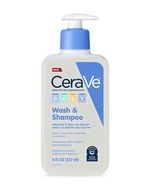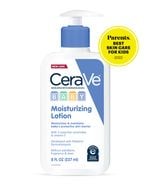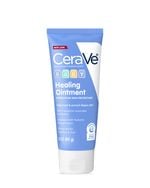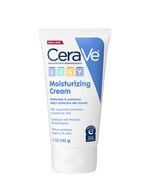Baby skin is naturally more delicate, permeable, and prone to irritation than adult skin. That’s why it’s important to choose baby products that are designed with their ultra-sensitive skin in mind. CeraVe baby skincare products are developed with pediatric dermatologists to help maintain their protective skin barrier. Formulated with hyaluronic acid, vitamin E, and three essential ceramides, our gentle, hydrating formulas for babies are fragrance-free, dye-free, and paraben-free. From tear-free baby wash to ointment, lotion, and more, our full range of baby skincare products can help give your baby’s skin the extra-special care it needs.
-
Baby Wash & Shampoo
Paraben-free baby shampoo and bath wash
Ingredients: AQUA / WATER / EAU, COCO-BETAINE, DISODIUM COCOYL GLUTAMATE, CITRIC ACID, CETYL HYDROXYETHYLCELLULOSE, CERAMIDE NP, CERAMIDE AP, CERAMIDE EOP, CARBOMER, TRIETHYL CITRATE, SODIUM CHLORIDE, SODIUM COCOYL GLUTAMATE, SODIUM PHYTATE, SODIUM LAUROYL LACTYLATE, SODIUM HYALURONATE, CHOLESTEROL, DISODIUM EDTA, TOCOPHERYL ACETATE, CAPRYLOYL GLYCINE, CAPRYLYL GLYCOL, PHYTOSPHINGOSINE, XANTHAN GUM, BENZOIC ACID Please be aware that ingredient lists for the products of our brand are updated regularly. Please refer to the ingredient list on your product package for the most up to date list of ingredients to ensure it is suitable to your personal use. (For refilled products in the store, the most up to date list of ingredients should be obtained locally after refill of the product on the point of sale).View Product Details -
Baby Moisturizing Lotion
Ingredients: AQUA / WATER / EAU, CETEARYL ALCOHOL, CAPRYLIC/CAPRIC TRIGLYCERIDE, CETYL ALCOHOL, PHENOXYETHANOL, NIACINAMIDE, DIMETHICONE, ALLANTOIN, POTASSIUM PHOSPHATE, CERAMIDE NP, CERAMIDE AP, CERAMIDE EOP, CARBOMER, ZINC CITRATE, BEHENTRIMONIUM METHOSULFATE, SODIUM LAUROYL LACTYLATE, SODIUM PCA, ARGININE PCA, SODIUM HYALURONATE, CHOLESTEROL, DIPOTASSIUM PHOSPHATE, DISODIUM EDTA, TOCOPHERYL ACETATE, TOCOPHEROL, LAURIC ACID, PHYTOSPHINGOSINE, XANTHAN GUM, POLYGLYCERYL-3 DIISOSTEARATE, POLYSORBATE 60, ETHYLHEXYLGLYCERIN Please be aware that ingredient lists for the products of our brand are updated regularly. Please refer to the ingredient list on your product package for the most up to date list of ingredients to ensure it is suitable to your personal use. (For refilled products in the store, the most up to date list of ingredients should be obtained locally after refill of the product on the point of sale).View Product Details -
Baby Healing Ointment
Active ingredient: PETROLATUM 46.5% Inactive ingredients:MINERAL OIL, PARAFFIN, OZOKERITE, DIMETHICONE, CERAMIDE NP, CERAMIDE AP, CERAMIDE EOP, CARBOMER, WATER, SODIUM LAUROYL LACTYLATE, PROLINE, CHOLESTEROL, PHENOXYETHANOL, TOCOPHERYL ACETATE, TOCOPHEROL, HYDROLYZED HYALURONIC ACID, PANTHENOL, PANTOLACTONE, PHYTOSPHINGOSINE, XANTHAN GUM, ETHYLHEXYLGLYCERIN Please be aware that ingredient lists for the products of our brand are updated regularly. Please refer to the ingredient list on your product package for the most up to date list of ingredients to ensure it is suitable to your personal use. (For refilled products in the store, the most up to date list of ingredients should be obtained locally after refill of the product on the point of sale).View Product Details -
Baby Moisturizing Cream
Ingredients: AQUA / WATER / EAU, GLYCERIN, CETEARYL ALCOHOL, CAPRYLIC/CAPRIC TRIGLYCERIDE, CETYL ALCOHOL, CETEARETH-20, DIMETHICONE, PETROLATUM, POTASSIUM PHOSPHATE, CERAMIDE NP, CERAMIDE AP, CERAMIDE EOP CARBOMER, BEHENTRIMONIUM METHOSULFATE, SODIUM LAUROYL LACTYLATE, SODIUM HYALURONATE, CHOLESTEROL, PHENOXYETHANOL, DIPOTASSIUM PHOSPHATE, DISODIUM EDTA, PHYTOSPHINGOSINE, XANTHAN GUM, ETHYLHEXYLGLYCERIN Please be aware that ingredient lists for the products of our brand are updated regularly. Please refer to the ingredient list on your product package for the most up to date list of ingredients to ensure it is suitable to your personal use. (For refilled products in the store, the most up to date list of ingredients should be obtained locally after refill of the product on the point of sale).View Product Details
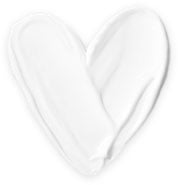
Compare Baby Products
| Skin Type | Concern | Key Benefits | Key Ingredients | Texture | ||
|---|---|---|---|---|---|---|
| Baby Wash & Shampoo | Baby Skin | Cleansing |
|
Ceramides, Hyaluronic Acid
|
Liquid Cleanser | |
| Baby Moisturizing Lotion | Baby Skin | Hydration/Moisturizing |
|
Ceramides, Hyaluronic Acid
|
Lightweight Lotion | |
| Baby Healing Ointment | Baby Skin | Diaper Rash/Skin Protectant |
|
Ceramides, Hyaluronic Acid, Petrolatum
|
Ointment | |
| Baby Moisturizing Cream | Baby Skin | Hydration/Moisturizing |
|
Ceramides, Hyaluronic Acid
|
Cream |
Frequently Asked Questions
-
How is baby skin different from adult skin?
Baby skin is structurally different from adult skin. Because it’s still maturing, your baby’s skin is very delicate and sensitive to the outside environment. When compared to adult skin, one study reported that the epidermis (outer layer) of infant skin is 20% thinner—with a protective skin barrier that’s approximately 30% thinner than adults.1
-
What are some common baby skincare concerns?
The skin barrier is an essential gatekeeper between your baby’s skin and the external environment. It helps lock in moisture and defend against irritants, allergens, and germs on the skin’s surface. Because it takes at least two years for an infant’s skin barrier to fully develop, baby’s skin may be more vulnerable to external irritants and transepidermal water loss (TEWL).2
Some examples of skin concerns in baby skin include flakiness, diaper rash, neonatal acne (baby acne), and miliaria (heat rash). Eczema (formally known as atopic dermatitis) is another skin condition seen in babies, affecting up to 25% of children in the United States.3 If you have any concerns regarding your baby’s skin, schedule an appointment with your pediatrician or board-certified pediatric dermatologist.
-
Why is my baby’s skin so rough?
Babies can sometimes develop dry, rough patches of skin. This rough texture is especially common during the first few months after birth, as your baby’s skin adjusts from the protective environment of the womb to the harsher, drier conditions of the outside world. Rough patches of skin can also be a reaction to certain ingredients, fabrics, or potential allergens. Always consult with your pediatric dermatologist for the best advice on treating rough baby skin.
-
Why does my baby’s skin turn red?
Baby rashes, which are considered very common, can cause your baby’s skin to turn red. Redness from diaper rash, for example, can be caused by a fungal infection, harsh soaps, excessive moisture, or sweat. Saliva from drooling—sometimes known as a “drool rash” or “spit-up rash”—is another common rash caused by irritation around a baby’s mouth and chin.
About half of all newborns experience a red, blotchy rash known as erythema toxicum at around two to three days-old that typically resolves on its own. Consult with your pediatrician or pediatric dermatologist for personalized advice if you are concerned about redness on your baby’s skin. -
Why does my baby’s skin peel?
There are many possible reasons why your baby’s skin may peel, which should always be assessed and managed by a pediatrician or board-certified pediatric dermatologist. If you’re wondering how to help dry skin on your baby’s face, it may help to moisturize regularly with a gentle, fragrance-free baby lotion.
-
How should I care for my baby’s skin?
Caring for your baby’s vulnerable skin can feel intimidating—for new and experienced parents alike. Understanding your baby’s skin type and baby skincare basics can help to keep things simple. Your pediatrician or pediatric dermatologist can help explain what to expect when it comes to your baby’s skin, why certain reactions occur, and which nourishing ingredients to look for in skincare products.
-
How do I find the best baby skincare products?
Everyone’s skin has its own unique needs—including your baby’s. Your little one’s delicate skin is highly sensitive, and the best baby skincare products are formulated with this in mind. We recommend baby skincare products that are gentle, fragrance-free, and developed without harsh ingredients that may disrupt the skin barrier. Pediatric dermatologists generally agree that a simple, “less is more” approach is best when caring for dry baby skin.
CeraVe’s collection of baby skincare products align with all of the above. Our formulas are designed to help maintain the skin’s natural moisture barrier—which helps to keep moisture in and harmful elements out. They also feature ingredients such as CeraVe’s three essential ceramides, hyaluronic acid, and vitamin E.*For informational purposes only—not a substitute for medical advice. Always consult with a doctor regarding any concerns for an accurate assessment and individualized guidance.
-
References
- Stamatas, Georgios N et al. “Infant skin microstructure assessed in vivo differs from adult skin in organization and at the cellular level.” Pediatric dermatology vol. 27,2 (2010): 125-31. doi:10.1111/j.1525-1470.2009.00973.x
- Rahma A, Lane ME. “Skin Barrier Function in Infants: Update and Outlook.” Pharmaceutics. 2022 Feb 17;14(2):433. doi: 10.3390/pharmaceutics14020433. PMID: 35214165; PMCID: PMC8880311.
- “How to Treat Eczema in Babies.” American Academy of Dermatology Association, 2022.
Skincare Solution Finder
PERSONALIZED SKINCARE DEVELOPED WITH DERMATOLOGISTS READY AT YOUR FINGER TIPS
